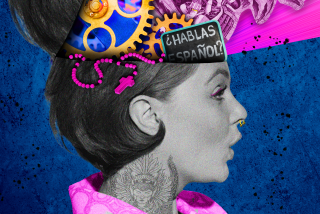Poverty, ‘Intellectual Blackness’ : Hungary Writer Tries to Shed Some Light on Gypsies’ ‘Dark World’
- Share via
BUDAPEST, Hungary — Born and reared in the squalid mud hut of a poor Gypsy family, Menyhert Lakatos can speak with conviction about what he calls “the dark world” that envelops Gypsy communities in Eastern Europe.
By his account, it is a world of ignorance, poverty and prejudice that modern development has done little to relieve. “It may seem romantic to an outsider, but the cultural situation of Gypsies is quite backward,” he said. “Our history has tied us to poverty, to begging, to intellectual blackness that threatens our survival.”
Lakatos sees himself as a rare case of upward mobility. Shot and wounded as a boy by a Hungarian landowner, he managed to convert his injury into a secondary school education sponsored by his assailant. Then he survived the Nazi death camp of Dachau--where his parents and five brothers and sisters were killed--and went on to attend a “people’s college” in postwar Budapest.
Now, the 61-year-old sociologist and writer is the president of the newly created Cultural Assn. of Gypsies and a leading figure of what he said is a group unique to Hungary--a “Gypsy intelligentsia,” both educated and loyal to its ethnic origins.
Road to Redemption
This movement, Lakatos said, is taking the first real steps toward cultural and political redemption for what remains both one of the largest and the most disadvantaged of ethnic minorities in Communist-ruled Eastern Europe.
“There are intellectual Gypsies elsewhere, but they pursue their own interests,” he said. “We are the only Gypsy intelligentsia that has a consciousness of itself as Gypsies and is trying to defend our people. If we intellectuals cannot find a different future for the Gypsies, we are condemning the people to death.”
So far, the accomplishments of the Gypsy group have included the creation of a handful of experimental elementary bilingual education programs for Gypsy children, a high school to train teachers in the Gypsy language and a newspaper for Gypsies that is to begin publication in December.
Lakatos’ cultural council, established in June, has been funded by about $160,000 from the Hungarian government. Another body, the National Gypsy Council, was set up last year under the Patriotic People’s Front, the Communist-sponsored political organization.
Official Neglect
These changes come in the context of official neglect generally for Gypsy communities in the region. Neither neighboring Romania, with a Gypsy population estimated at more than 1 million, nor Yugoslavia, with at least 300,000, has Gypsy-language schools or political organizations recognized by state authorities.
In Hungary, although the Gypsy population of more than 400,000 represents the largest ethnic minority in a country of 10 million, the community still does not enjoy the same political privileges as other groups. Two of those groups, Slovaks and Romanians, are considered independent nationalities by the authorities.
Lakatos argues that the Gypsies themselves bear much of the responsibility for this. “Things don’t depend only on permits,” he said during a recent interview at his suburban apartment here. “We have to prove to the society that we can act and that what we want is necessary.”
A pressing reason for action in Hungary is the rapidly growing underclass of Gypsies that has proved both a source of crime and a social and economic embarrassment for authorities. Around the country, thousands of Gypsies still live in slum housing and suffer from illiteracy and unemployment. Officials conceded last year that prejudice is intensifying.
Newspaper Report
A report last year in the newspaper Heti Vilaggazadasag said that 30,000 Gypsies were living in shantytowns and that 7,000 to 8,000 were involved in crimes each year. Unemployment is estimated by other sources at 10% to 20%. Lakatos said that about three-quarters of the Gypsies who are employed hold low-paying, unskilled jobs.
The Gypsy population here is rapidly expanding. Reduced to little more than 100,000 by a Nazi extermination drive in World War II, it has increased fourfold in the last 40 years. By the turn of the century it should exceed 600,000, according to recent estimates.
“The country has to choose, either it supports the Gypsies and provides them all the possibilities of culture and education or it commits a crime against itself,” Lakatos said. “We are becoming too large a part of society to be shoved aside.”
The task of the Gypsy intellectuals, he said, is to study the community’s history and find ways to separate its distinctive culture from the traditions of poverty that have become attached to it.
Old Traditions
“Much that is in our culture was the consequence of many centuries of fleeing from extermination,” Lakatos said. “We cannot tie ourselves to those old traditions--begging, stealing, ignorance--that poverty tied us to. These things are not any more necessary for us than they are for other human beings.”
The 200 Gypsy intellectuals who have gained prominence as writers, artists, academics and film makers in the last 20 years work in the Hungarian language and “have adopted the culture of the nation,” Lakatos said. “But it’s not necessary for us to give up our identity.”
A chief objective of the group is to strengthen the place of the Gypsy language in Hungary through publications and bilingual education. Several Gypsy-language textbooks have been published and the first elementary courses began in 1983.
“The greatest problem is the shortage of teachers who speak Gypsy,” Lakatos said.
At present, he said, although Gypsy children receive automatic places and scholarships for kindergarten, only 52% of those eligible attend, contrasted with 96% of Hungarian children.
“Our objective is that Gypsies should be equal educationally and professionally to non-Gypsies,” he said. “Because as long as the culture of the Gypsies is not raised to a level where we can fight against prejudice, the prejudices will remain. We must overcome them through our own work.”


